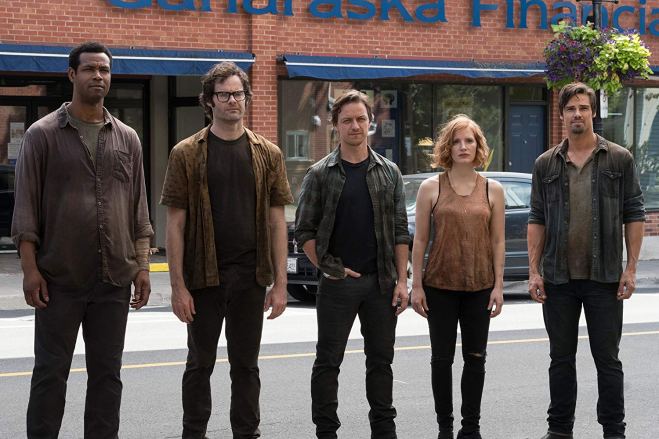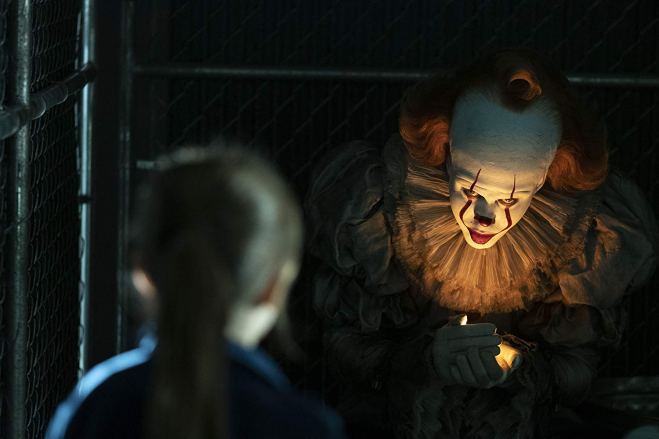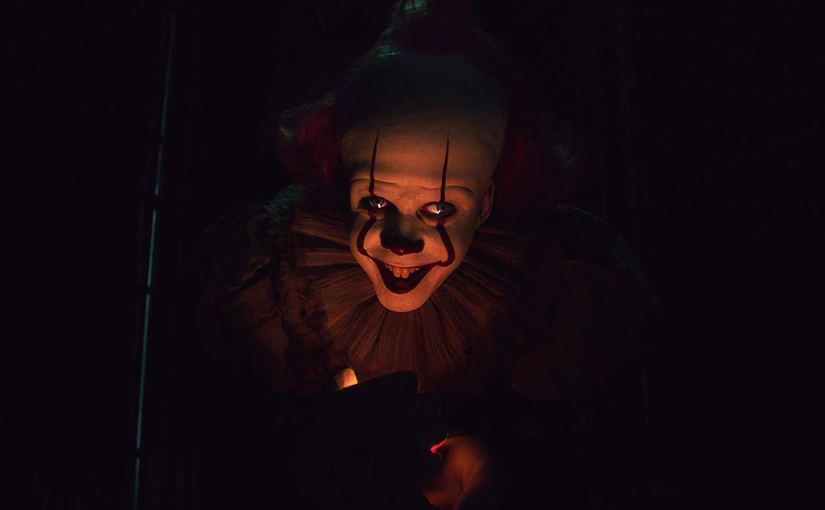Less chiller, more adventure for King’s dancing harlequin
‘I never had any friends later on like the ones I had when I was 12. Jesus, does anyone?’ We’re 33 years on from Stand By Me, yet its legacy continues to breathe. Muschietti’s first IT took heed of Stephen King’s affection for pure adolescence, reassembling his near-biblical horror odyssey into a lean coming-of-age fable; weaving the infectious familiarity of potty-mouthed liberty, Stranger Things-esque tone, and the inevitable loss of innocence.
Nostalgia was always Muschietti’s greatest enemy. King’s fiendish monster wasn’t a stranger to the screen: Tim Curry’s indelible turn in 1990’s otherwise dire mini-series birthed a multitude of generation’s phobias forevermore. But, as 2017’s first chapter opened on Georgie’s unfading, horrendous demise, it was clear the director knew his onions.
After seemingly defeating Pennywise, the child-eating clown (Bill Skarsgård) – with bats, chains and, of course, the power of friendship – the tweens of the Losers Club made a blood-oath to return if ‘it’ ever came back. IT Chapter Two fast-forwards 27 years later, and that promise is calling from the drains.
We’re reintroduced to Derry with true-to-life terror: as per the novel, the film begins with a teeth-crunching homophobic attack that does anything but skimp on acoustically sickening blows. The town’s rednecks detest gay men, but don’t expect further commentary on the US’ LGBT+ conflicts – it’s a medium for surface-level sickness, a reminder that nearly everyone outside the Losers is, basically, a villain, and a narrative tool. By one way or another, it spurs the re-emergence of the sewer’s frill-spangled beast – and he’s carrying an even harsher feasting ethic.
Meanwhile, the ragtag group of clown-killers are all grown-up. Bill (James McAvoy) is a successful author battling studios over screen adaptations of his work, constantly the butt of bad ending jokes (wink wink); Beverley (Jessica Chastain) has a successful career but is, again, ensnared in an abusive relationship; Ben (Jay Ryan) has shed the flab and transformed into a chiselled, high-flying architect; Richie (Bill Hader) has channelled his trash-mouth into stand-up comedy; Eddie (James Ransone) has cut a risk assessment vocation out of his hypochondriacal psyche and swapped out an anxiety-ridden mother for a (hilariously) similar wife; and there’s Stanley (Andy Bean), with a low-key, suburban lifestyle.

One Loser remains: Mike (Isaiah Mustafa). ‘Me? I never left… I remember all of it,’ he says. Clocking the return of ‘it’, he calls upon the group to cash in the oath and rally them to Derry. Excluding Mike, their recollections have mostly faded to a distant blur – although their unholy reunion causes a tidal wave of memory. Some moments welcomed, others packaged with nausea.
If the first chapter was about tackling the unknown, the sequel revolves around the aftershocks of trauma: while the Losers enjoy each other’s company upon meeting again, it’s evident they’re still harbouring past demons: one mention of the clown sends Eddie reaching for his inhaler, and Bill’s stutter clicks in. Beverley has the most tragic arc, going from her monstrous father to a (briefly seen) toxic husband where abuse is as frequent as a morning kiss. While her dad’s shadow lingers like a spectre, and despite a very strong performance from Chastain, her self-destruction isn’t entirely well-observed.
In translating King’s 1,138-page slab, Muschietti and screenwriter Gary Dauberman had wacky, sometimes repellent nonsense to trim: the giant turtle, the macroverse, and thank the lord, the sewer orgy. But some things remain: Henry Bowers’ presence is utterly pointless, there’s some creepy crawlies that echo The Thing‘s Lovecraftian scarily strange incarnations, and the romantic sub-plots. The ‘January embers’ latter bogs the film down; cutesy, yes, but predictable.
The group are better as a club than split up – though Hader’s Richie is a fiercely funny, rather heartbreaking force of nature. The quick-fire, sweary rapport as the Losers rekindle their loveable ticks over dinner, particularly between Richie and Eddie, manages to fleetingly bottle their former selves’ chemistry. Then, a major moment in the film sees the members split up (aptly pointed out as ‘fucking stupid’) to probe their buried teenage experience.

IT has always been psychological – the villain feeds on your fear – and Chapter Two establishes quickly that Pennywise isn’t just out to eat the adults; he wants to brutally torment them. In a string of rinse-and-repeat set-pieces (easily the film’s most tedious and runtime-pestering stretch), each individual Loser faces off with ‘it’ in some form while intersecting with flashbacks from their past selves: for example, Richie revisits an arcade where he was bullied, and Beverley makes a trip to her old home where an elderly woman now lives (a fixture of the sequel’s trailers). The de-aging technology on the kids is relatively seamless in these scenes, but the incessant reliance on them sees the film drag its feet from encounter-to-encounter.
McAvoy walks away with the movie’s best sequence; an frightening, dazzling funhouse (a nightmarish arena illuminated by Checco Varese, whose cinematography consistently blends vintage polaroid and wide, deliberately detailed framing), where Bill is desperately pursuing a young boy under the watchful drool of Pennywise (Skarsgård’s symbiotic relationship with the character should see him worshipped in the house of horror for years to come). This, and a baseball game munch, capture the very essence of what makes the clown so terrifying: its ruthlessness. The monster is at ITs best when there’s a horrid vulnerability: like Dennis Nedry’s demise at the hands of the dilophosaurus in Jurassic Park, that feeling of the clown whetting his appetite and moistening the child up with a mix of faux-security and ‘tasty, tasty, beautiful fear’ sends a shiver down your spine.
While lower-league child actors are offered up for the antagonist’s cravings throughout, the Losers are frustratingly protected by plot armour. On more than one reality-warping occasion, Pennywise proves that saying ‘it’s not real’ is no longer an adequate antidote to his transcendent onslaught; but he has very little agency in actually causing harm to the main cast – in return, the stakes are meagre and the scare-count is dreadfully scarce.
But the film’s horror elements are packaged in the mould of a fantastic adventure movie: like its Amblin-chasing predecessor, Chapter Two sees its grown-ups band together (under the leaping music of Benjamin Wallfisch’s classically fabulous composition) in the face of adversity to ‘kill this fucking clown’ – excellently delivered by Hader. ‘We are what we wish we could forget,’ the opening narration posits – to heal, we must recognise and conquer. For our Losers, childhood never reached a natural end, even as they broach their 40s – and while the boss battle succumbs to tiresome, modern CGI-trappings, the context of their fight remains steadfast.
King’s magnum opus gets its reverent due. Sparse on scares but plentiful in fun, it’s the epic grown-up Goonies sequel we’ll never get.
Rating: ★★★★☆
Cameron Frew – @FrewFilm


